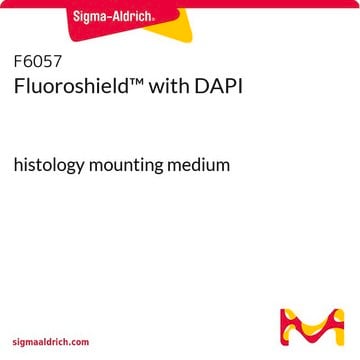5.08741
DAPI Stain
Synonyme(s) :
DAPI Stain, 4ʹ,6-Diamidino-2-phenylindole, 2HCl, 2-(4-Amidinophenyl)-1H-indole-6-carboxamidine, 2HCl, 2-(4-Carbamimidoylphenyl)-1H-indole-6-carboximidamide, 2HCl, DAPI, ≥97% by HPLC, in H₂O
About This Item
Produits recommandés
Essai
≥97% (HPLC)
Niveau de qualité
Forme
liquid
Fabricant/nom de marque
Calbiochem®
Conditions de stockage
OK to freeze
avoid repeated freeze/thaw cycles
protect from light
Fluorescence
λex ~359 nm
λem ~461 nm
Température de stockage
−20°C
Chaîne SMILES
Cl.Cl.[nH]1c2c(cc1c3ccc(cc3)\C(=N\[H])\N)ccc(c2)\C(=N\[H])\N
InChI
1S/C16H15N5.2ClH/c17-15(18)10-3-1-9(2-4-10)13-7-11-5-6-12(16(19)20)8-14(11)21-13;;/h1-8,21H,(H3,17,18)(H3,19,20);2*1H
Clé InChI
FPNZBYLXNYPRLR-UHFFFAOYSA-N
Description générale
Application
- Determination of Ploidy Levels and Nuclear DNA Content in Cryptococcus neoformans by Flow Cytometry: Drawbacks with Variability: This research utilizes DAPI for quantifying nuclear DNA content and determining ploidy levels in Cryptococcus neoformans, providing critical insights into fungal genetics and potential challenges in reproducibility (Chang et al., 2024).
- Near-Infrared Light-Excited Quinolinium-Carbazole Small Molecule as Two-Photon Fluorescence Nucleic Acid Probe: Highlights the development of a novel two-photon fluorescence probe for nucleic acid imaging, employing DAPI as a reference for comparing fluorescence characteristics, enhancing molecular imaging techniques (Sun et al., 2024).
- A FACS-based Novel Isolation Technique Identifies Heterogeneous CTCs in Oral Squamous Cell Carcinoma: Applies DAPI for the enumeration and characterization of circulating tumor cells (CTCs), showcasing its importance in cancer diagnostics and the potential for personalized medicine approaches (Chauhan et al., 2024).
Actions biochimiques/physiologiques
DNA
Conditionnement
Avertissement
Forme physique
Reconstitution
Autres remarques
Cubria, C., et al. 1994. Comp. Biochem. Physiol. C.105, 251.
Hotz, M.A., et al. 1994. Cytometry15, 237.
Lee, L.S., and Garnett, H.M. 1993. J. Biochem. Biophys. Methods26, 249.
Miller, T., et al. 1993. Biotechniques15, 1042.
Gray, J.W., et al. 1982. Science238, 323.
Hessling, J.J., et al. 1980. J. Immunol. Methods38, 315.
Russels, W.C., et al. 1975. Nature253, 461.
Informations légales
Mention d'avertissement
Warning
Mentions de danger
Conseils de prudence
Classification des risques
Skin Sens. 1
Code de la classe de stockage
12 - Non Combustible Liquids
Classe de danger pour l'eau (WGK)
WGK 2
Point d'éclair (°F)
Not applicable
Point d'éclair (°C)
Not applicable
Certificats d'analyse (COA)
Recherchez un Certificats d'analyse (COA) en saisissant le numéro de lot du produit. Les numéros de lot figurent sur l'étiquette du produit après les mots "Lot" ou "Batch".
Déjà en possession de ce produit ?
Retrouvez la documentation relative aux produits que vous avez récemment achetés dans la Bibliothèque de documents.
Notre équipe de scientifiques dispose d'une expérience dans tous les secteurs de la recherche, notamment en sciences de la vie, science des matériaux, synthèse chimique, chromatographie, analyse et dans de nombreux autres domaines..
Contacter notre Service technique




